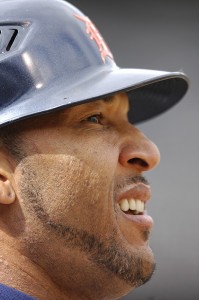Gary Sheffield is an interesting case for the Hall of Fame. As with so many guys of his era, steroids come up a a big issue. Sheffield admitted to a grand jury that he unknowingly used a steroid cream during 2002. Many folks theorize that he had used other substances as well but there have been no formal accusations or admissions. There’s not a lot more we can say on the subject of steroids, though–exactly how it will affect his candidacy remains to be seen.
What we do know about Sheffield for sure are the facts: he topped 500 career homers with a 140 OPS+, was a 9-time all star (at two different positions), received MVP votes in 7 different seasons including 4 top-6 finishes, and he homered in every post-season series in 1997 as his Marlins won it all.
Still, he’s not a slam dunk candidate by any means. Click through for the debate and poll.Sheffield was one of the most feared hitters of his time–and it was usually the 3rd-base coach who was most afraid. Sheffield had incredibly quick wrists and was the master of hitting smash line drives down the left-field line. He racked up a lot of doubles and homers this way.
He was also gruff and seemed to wear our his welcome on many teams. Just look at his list of career stops: Milwaukee, San Diego, Florida, LA Dodgers, Braves, Yankees, Tigers, Mets. The Marlins were the only team with which he played more than 4 seasons. After his time with the Marlins, Sheffield was on 5 different playoff teams but batted only .216 in 111 at bats in those years. While it’s certainly not entirely his fault, his team lost 5 out of 6 playoff series during that stretch.
Anyway, here’s a look at the pros and cons of his case.
For Gary Sheffield in the Hall of Fame
- He’s one of just 22 players in history with 450 doubles and 450 homers. It’s true that this mark has been significantly easier to achieve in Sheffield’s era, with half the entrants having played as recently as 1995, but that’s still only 11 guys that he is among.
- Sheffield is 30th all-time in the Batting Runs component of rWAR. That is damned impressive. He’s ahead of a lot of all-time greats, including Joe DiMaggio, Eddie Mathews, Mike Schmidt, Reggie Jackson, and Carl Yastrzemski. (Keep in mind that this stat is era-corrected, so he doesn’t get the same benefit as the raw counting numbers in the bullet point above.)
- From 1995 to 2004, Sheffield had a 157 OPS+ over 5916 plate appearances. As a peak, it’s not as high as some, but at 10 years it’s very long. (As further proof of his distributed peak, his best seasons were a 189 OPS+ in 1996 and a 176 OPS+ in 2000.) Only two players had at least 5000 PAs over that same period and a better OPS+: Barry Bonds (206) and Manny Ramirez (159). Jim Thome was tied with Sheff at 157.
Against Gary Sheffield in the Hall of Fame
- Sheffield did not play good defense. Consider this: he’s 29th in career oWAR, but in overall WAR among batters he’s just 89th. He had a staggering 11 different seasons where he was worth at least -1 win above replacement on defense and overall he finished at -18.4 dWAR for his career. Wow, that’s bad.
- Sheffield is, in fact, worst all time in the Fielding Runs component of WAR:
Rk Player Rfield From To 1 Gary Sheffield -178 1988 2009 2 Derek Jeter -143 1995 2011 3 Bobby Bonilla -121 1986 2001 4 Danny Tartabull -120 1984 1997 5 Bernie Williams -118 1991 2006 6 Eddie Yost -114 1944 1962 7 Juan Samuel -113 1983 1998 8 Rick Monday -112 1966 1984 9 Chris Gomez -111 1993 2008 10 Manny Ramirez -110 1993 2011 11 Ty Wigginton -110 2002 2011 12 Ricky Gutierrez -110 1993 2004 13 Bill Madlock -110 1973 1987 Most of these guys accumulated such negative totals because they were good with the bat, and the same is true in Sheffield’s case. But that doesn’t change the fact that we must discount his overall value based on the fact that he hurt his teams with defense.
- Sheffield had remarkably little black ink–just 4, and those come from winning the NL batting title in 1992. He never led the league in any other of the ink-related categories, and that pretty well sums up his career–he was never the best overall player in baseball, but he was in the top 10 for just about all of his career. In other words, he was never a top-tier superstar–“merely” fantastic for many years.
Now please vote in our poll:

